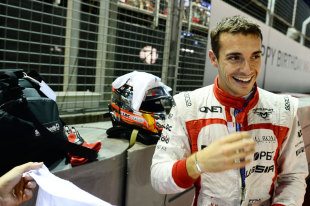
Formula One has a slight problem when it comes to the perennial backmarkers. How can the stewards fairly penalise a driver who is already stuck at the back of the grid by default?
F1 stewarding is controversial at times, but the stewards themselves do an excellent job. Over the past few seasons the documents explaining their decisions have become more detailed, listing not just the 'what' of the offence, but also the 'whys' and 'hows' of the decisions taken.
It goes without saying that some decisions will be unpopular - such is the nature of a sport with such a passionate fanbase. If your favourite driver is issued with a penalty at a critical juncture - like Lewis Hamilton's disqualification from qualifying in Barcelona after a stonking pole lap in 2012, or Michael Schumacher's similar penalty at the next race in Monaco - hackles will be raised.
But the stewards have a hard job to do and they do it well. I can think of numerous occasions in my short time in this sport where I have ranted and raved about the madness of a seemingly irrational decision, only to change my mind after a candid chat with one of the men or women responsible for taking that decision.
They have access to reams of information we never see, from onboard footage covering almost every angle of a shunt to the telemetry and GPS data that stays inside Race Control. Fans and media, on the other hand, base our decisions on gut instinct and the world television feed.
The introduction of a driver steward has made penalties increasingly sensible, and it certainly helps to have an experienced hand to define what counts as a racing incident and what counts as crossing the line. And not just those white ones at the edge of the track…
But where F1 stewarding falls short is when it comes to the x offence begets y penalty nature of the rulebook.
This afternoon in Korea Jules Bianchi was issued with a three-place grid penalty (and a reprimand) for impeding Paul di Resta during qualifying. There's no arguing with the fact that drivers should be penalised for incidents that affect the outcome of another driver's race. But how much of a punishment is it to demote someone from P21 to P22 on the grid?
For those with a real chance of scoring points, podiums, or victories, a grid drop hurts. So too do stop-gos, drive-throughs, and time penalties. But when the best a team or driver can hope for is a P13ish finish in a race of attrition, none of the available penalties lead to much of a punishment.
It's a problem with no obvious solution, unless points were extended to cover the whole grid, and that's no answer. In a different era of racing, when reliability issues meant that every car on the grid had some chance - no matter how small - of finishing in the points, the current system would be effective.
But with quasi-bulletproof cars and points-paying positions locked out by the biggest teams in the paddock, penalising the likes of Bianchi is not equivalent to penalising the likes of a championship contender. Identical punishments don't have identical impacts, and that's a real problem.

